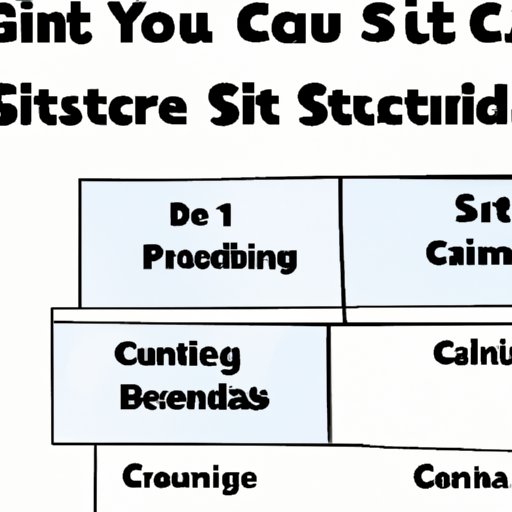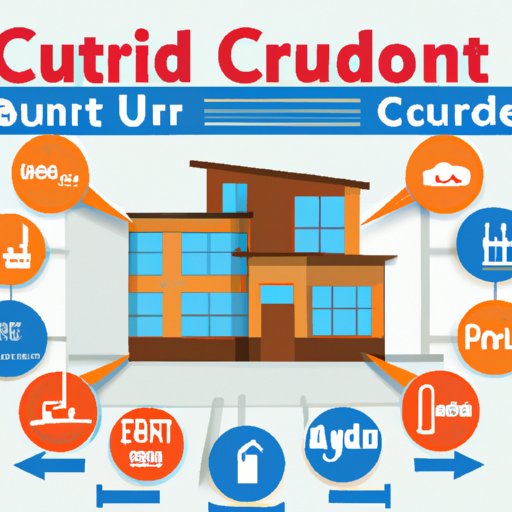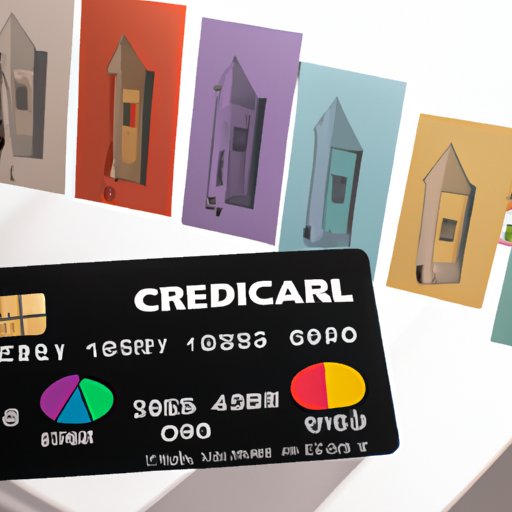Introduction
Your credit score is one of the most important numbers in your life. It affects your ability to obtain loans, secure rental agreements, and even get a job. A good credit score can help you save money on interest rates and qualify for better loan terms. On the other hand, a bad credit score can cost you thousands of dollars over the course of your lifetime. Therefore, it’s important to understand the basics of building and maintaining a good credit score.
In this article, we’ll explore the basics of building and maintaining a good credit score, steps to take when first starting to build credit, different types of credit accounts and their benefits, tips on how to responsibly use credit cards, and resources for further information about building credit.

Basics of Building and Maintaining a Good Credit Score
To build a good credit score, the first step is to understand the basic components of your credit score. Your credit score is based on five factors: payment history, credit utilization, length of credit history, new credit, and types of credit.
Payment history is the most important factor in determining your credit score. Paying bills on time is essential for maintaining a good credit score. According to Experian, “Late payments remain on your credit report for seven years and can significantly hurt your credit score.”
Another important factor is credit utilization, which is the amount of available credit that you are using. Generally, it’s recommended to keep your credit utilization below 30%. Keeping credit utilization low can help improve your credit score.
Length of credit history is also an important factor. The longer your credit history, the better. Having a long credit history can help demonstrate that you have experience with managing credit.
New credit is another factor that can affect your credit score. Applying for multiple credit cards or loans within a short period of time can lower your credit score. It’s best to only apply for new credit when necessary.
Finally, the type of credit you have can also affect your credit score. Different types of credit (e.g., credit cards, personal loans, home loans, auto loans) can help demonstrate that you are able to manage different types of debt.

Steps to Take When First Starting to Build Credit
If you’re just starting to build credit, there are several steps you can take to begin building a good credit score. One option is to obtain a secured credit card, which requires a cash deposit to open the account. This type of credit card allows you to build credit without taking on too much risk.
Another option is to become an authorized user on another’s account. An authorized user will receive a credit card linked to the primary cardholder’s account. This can help establish a positive credit history.
Finally, you can apply for a credit-builder loan. These loans are typically offered by credit unions and are designed to help individuals build or rebuild their credit. With a credit-builder loan, you borrow a set amount of money and then make regular payments on the loan. Once the loan is repaid, you’ll receive the money back plus any interest earned.
Different Types of Credit Accounts and their Benefits
There are several different types of credit accounts that can help you build a good credit score. Credit cards are one of the most common types of credit accounts. Credit cards can help you build credit quickly, as long as you use them responsibly and pay your bills on time. Credit cards can also provide rewards such as cash back or points, which can be used for travel or other purchases.
Personal loans can also help build credit. Personal loans can be used for a variety of purposes, such as consolidating debt or financing a large purchase. Personal loans usually have lower interest rates than credit cards, so they can be a good choice if you need to borrow money.
Home loans and auto loans are two other types of credit accounts that can help you build a good credit score. Home loans and auto loans typically have lower interest rates than other types of loans, and they can help demonstrate that you’re capable of managing larger amounts of debt.
Tips on How to Responsibly Use Credit Cards
Using credit cards responsibly is essential for building and maintaining a good credit score. Here are some tips for responsible credit card use:
- Make payments on time. Late payments can negatively impact your credit score.
- Pay more than the minimum balance. Paying only the minimum balance can lead to high levels of debt.
- Monitor spending. Keep track of your spending to ensure that you’re not overspending.

Resources for Further Information about Building Credit
If you want to learn more about building credit, there are several resources available. Credit counseling services can help you develop a plan to improve your credit score. There are also numerous financial education websites that provide helpful advice on how to build and maintain a good credit score. Additionally, there are several credit monitoring tools that can help you track your credit score and alert you to any changes.
Conclusion
Having a good credit score is essential for anyone looking to make major purchases in the future. By understanding the basics of building and maintaining a good credit score, taking steps to build credit, and using credit cards responsibly, you can start building a good credit score and enjoy the benefits that come with it.
(Note: Is this article not meeting your expectations? Do you have knowledge or insights to share? Unlock new opportunities and expand your reach by joining our authors team. Click Registration to join us and share your expertise with our readers.)
